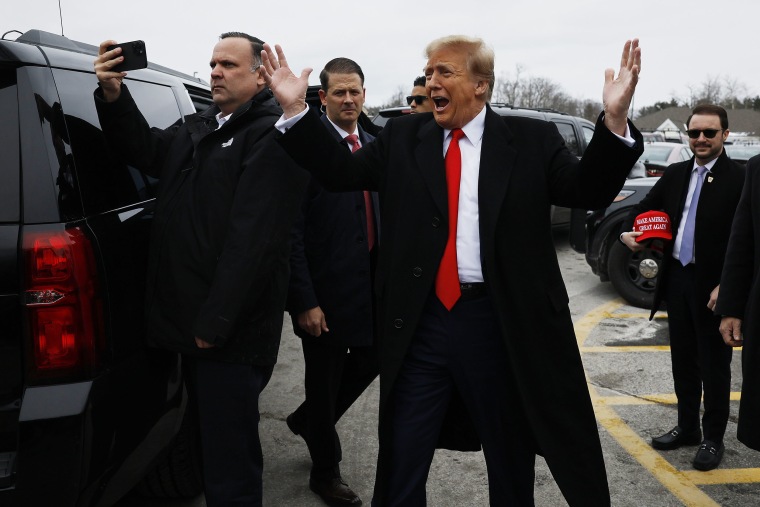Barring some legal or health emergency, Donald Trump is going to be the Republican nominee in 2024. His projected victory in New Hampshire over Nikki Haley almost certainly closes the window of possibility for Haley to even keep the contest competitive. She now faces a do-or-die last stand in her home state of South Carolina, where (still limited) polling suggests a very uphill battle.
There are lots of reasons we’ve ended up with Trump back in a position of party dominance.
Of course, Trump has looked like the de facto nominee for so long that political junkies and neophytes alike might be forgiven for viewing the aspirations of replacing him as the leader of the Republican Party as delusional.
But I’m not quite so sure. We know Trump was politically weakened by the disastrous performance of his handpicked candidates in the 2022 midterms. He was even losing in some head-to-head polling with Ron DeSantis at one point
In the end, there are lots of reasons why we’ve ended up with Trump back in a position of party dominance. The indictments that perversely enabled a kind of martyrdom irresistible to the GOP base and DeSantis’ utter lack of charisma and cringey, ham-fisted campaign both had a lot to do with it. But fundamentally, the reason Trump won is that you can’t beat something with nothing, and the non-Trump wing of the Republican Party still hasn’t come up with something to offer.
Trump’s most important ideological and rhetorical innovation in 2016 was to sense, in his weird, loose and lizard-brained way, that the old ideological consensus that had held the Republican Party together had fallen apart. He intuited that the three-legged stool of Reaganism — religious conservatives, national defense hawks and Milton Friedman-admiring free market zealots — was collapsing due to the twin disasters of the Iraq War and the financial crisis. All he had to do was deliver a final swift kick.
Trump made transactional appeals to the religious conservatives on abortion, outsourcing Supreme Court picks to them, but in rhetoric and framing basically abandoned the other two legs of the stool. On domestic policy, he ran against the Paul Ryan-conservative wonk orthodoxy on trade, immigration and Social Security/Medicare, and in a way that far more closely matched the actual positions of GOP voters. On foreign policy, he lied about being opposed to the Iraq War and successfully painted his other primary opponents (and Hillary Clinton) as reckless military adventurists.
Now, it’s crucially important to note that while Trump shifted the ideological language of the party considerably, the actual policy priorities moved very little. Trump’s two biggest legislative initiatives were his failed attempts to repeal the Affordable Care Act and his successful attempt to slash corporate taxes and taxes for rich people. Both of those were right out of the Paul Ryan playbook. (Ryan himself shepherded both through in the House.) Trump also failed to end the “endless wars,” most notably in in Afghanistan (Biden actually did that). He considerably increased drone strikes and targeted killing, flirted with military intervention in Venezuela, killed the Iran nuclear deal and ordered the assassination of Iranian Gen. Qassem Soleimani.
In other words, Trumpism as a governing agenda was a whole lot closer to establishment orthodoxy than the campaign version of Trumpism that gave him such a competitive advantage in the primary. And, of course, his ideological pitch to voters was only one part of the appeal: There was also his pre-existing fame, his knack for showmanship and the authoritarian populism and bigoted, sexist rhetoric that so many in the base ate up — and that no other candidate was quite shameless or sociopathic enough to successfully pull off.
Trumpism as a governing agenda was a whole lot closer to establishment orthodoxy than the campaign version of Trumpism that gave him such a competitive advantage in the primary.
The question I had when the 2024 campaign started was what ideological vision Trump’s competitors would use to try to woo voters away from him. The answer ended up being incredibly boring. Trump offers his voters a unified vision to replace Reagan-era rhetoric: He’ll be a strongman who will enact retribution and pain on all the people you don’t like. DeSantis tried his own cramped and strained version of Trump’s nastiness but it was just too weird and online to work. He just sounded like an angry nerd. But the rest of the field, including Haley, basically just tried to run as pre-Trump Republicans. Their messaging did not suggest much insight into why he was able to pry the party from them in the first place.
Case in point, Haley’s repeated attacks on Trump for running up deficits. “No one cares about the deficit!” I found myself yelling at the TV. Haley also decided to stake out a position on raising the retirement age for Social Security. This is something that many Republicans and conservative think tanks have supported for decades, but Trump was able to use it (alongside racist nicknames and “birther” conspiracies) to absolutely bludgeon her down the stretch in New Hampshire.
Actually, when you of think of it, base xenophobia paired with a pledge to protect Social Security against the establishment is about as succinct a description of Trumpism’s appeal to GOP voters as you could produce. It’s what a majority of GOP primary voters want. Or at least, they prefer it to the alternatives. Maybe there was never going to be a successful alternative this primary, but in the end, no one really tried to provide one.

